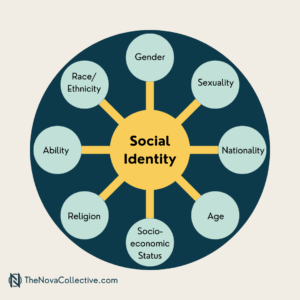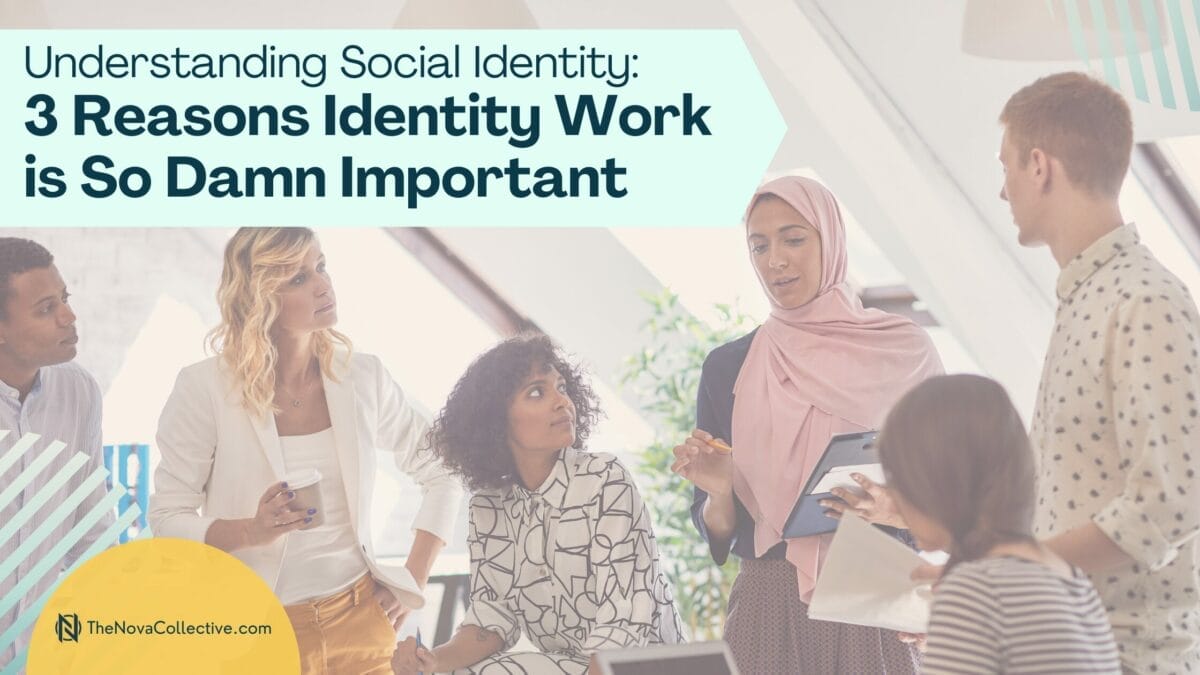Who are you?
How do you define yourself?
How do you show up with other people in certain situations? Is it always the same?
Put simply – Do you know your true identity?*
*If you answered ‘yes’, because you have done Identity exploration or because your multiple marginalized identities give you an awareness that others do not have to have, forward this article immediately so everyone else can catch on and catch up.
These are big, vague questions that may seem difficult to pin down, and the answer is usually “it’s complicated!”.
It is complicated – and too often in diversity and inclusion conversations at work we want to simplify these narratives, making them more digestible and consumable to the total workforce. We want the trending Unconscious Bias training, or the webinar on Allyship (both of which have absolute value). We too often jump at these tactics with a ‘one size fits all’ approach, when we know that all too often that translates into ‘one size fits none’. So before we dive headfirst into Unconscious Bias, let’s make sure we are equipping our workforces with Consciousness around their Identities.
We have long-promoted Identity work as being a meaningful framework and cornerstone of any workplace D&I program. To help us talk through why Identity is such a priority, we spoke with our Head of Learning Content & Delivery, Noor Ali.
Noor describes Identity like this:
“If we’re talking about Identity 101, if no one in a group has ever really thought about it, we want to differentiate between what is a social identity and what is a personal identity. Things we hold that don’t impact the way we receive resources or gain access or privilege in society are seen as personal identities. And those things that lump us into groups and either give us power and privilege in society or inhibit power and privilege in society, those are seen as social identities.
Social identities on an institutional level, will often impact someone’s access. I often think about it as “What will make me more likely to become president”. What identities are going to help me become president and what identities am I going to have to make up for when I’m trying to become president. So we’ll talk through social identities like race and ethnicity, gender, sexual orientation, religion, class, citizenship and so on and how those identities impact someone’s experience.”
That’s a lot, right? It is…and it isn’t. Foundational and continued identity work can give every person in your organization a better framework, toolkit and intentionality on their inclusion journey.
Here are 3 reasons we believe Identity work to be critical to the success of your D&I initiatives:
No one is a monolith
While you might be the sum of your parts, you are also the parts of your parts.
No single person is entirely represented by one facet of their identity.
Noor says, “I think about – what are ways in which my identities interact with one another? So I’m never just a woman – I’m also an Arab woman. I’m an Arab, Muslim woman. So you’re adding ethnicity, gender, religion and exploring how those intersect.“

So much of the conversation around inclusion, bias and privilege can tend to be broad – approaching the issues from a “whole person” perspective without the nuance of different identities and lines of difference. Ultimately, the whole person is who is impacted in any given situation, and no one is absolved from engaging in these tough conversations simply by parsing their identities.
It can feel overwhelming, frustrating and even lead to anger/resentment to engage in these conversations on a binary. If someone doesn’t have the understanding or framework of their multiple identities to view different dynamics through, they can shut down very valid work by thinking it doesn’t (or shouldn’t) apply to them.
Framework for other work
A common example of the “no one is a monolith” idea in action is privilege. We see individuals struggle with the concept of privilege all the time…maybe they grew up low-income or have had other setbacks in their life that they feel exempts them from benefiting from privilege. Maybe they’ve worked really, really hard to get to where they are and they resent the idea that anything was “easy” for them. And they aren’t wrong to feel this way.
With the benefit of Identity work, we can frame the conversation differently – talking about who holds what kind of privilege across the different facets of identities. So, perhaps someone did not experience socio-economic privilege, but they did benefit from male privilege. Those are two different things, and bear thoughtful discussion across those lines of difference. One does not absolve the other.
Similarly, conversations around bias take on a whole new lens when breaking it down across lines of Identity. Understanding where you have been taught to hold bias based on your own identity and the identity of others can unlock useful tools for resisting bias, instead of triggering a shame/guilt storm that leaves you feeling hopelessly prejudiced and powerless. Allowing space for someone to explore smaller facets – instead of giant labels – can engage your employees on a much deeper and more meaningful level.
Noor puts it best by saying, “The idea of becoming conscious of social identity, and group dynamics as a result of social identity, is that then someone has the right tools to be able to create better output.”
Personal work involves everyone – or, the ‘so what/what now’ effect
We often see disheartening reports of the “blowback” from D&I initiatives. Research from Ernst and Young and ORC International shows that White men feel left out of diversity initiatives. Studies have also shown that, when not implemented correctly, bias training can actually activate more bias or spark a backlash.
At Nova, we see this tension as the ultimate balancing act – how can you center the experience of your most marginalized employees while still showing everyone their role in inclusion? Identity work makes it personal, and leaves no one out.
Everyone has identities, and most everyone has ways they are privileged (thus have agency) and ways they are marginalized in society.
When working with dominant identities, Noor found that identity mapping and dialogue could lead to increased personal accountability.
“They would say – ‘are you saying that I didn’t work hard to get here?’ No, you absolutely worked hard and you pushed through certain things. They don’t cancel out. That is what is useful about separating out social identities. Yes, you’ve been marginalized in this sense AND you hold privilege in other ways. Now you can say “I need an ally here but I can be an ally here”. So much growth and so much agency can come out of recognizing where you can create change.”
This is why Identity work is so damn important. We can involve everyone, be inclusive, and still seek to center the experiences of marginalized folks. We can get everyone in on the act of inclusion. So let’s roll up our sleeves and get to work answering the million dollar questions: “Who am I? Who are you? And where can we go from here?”

